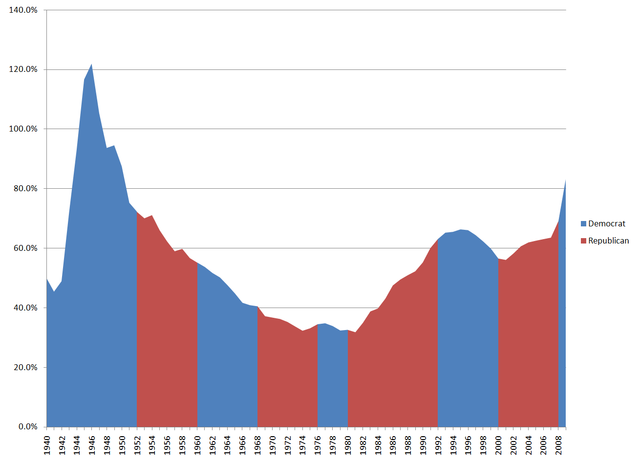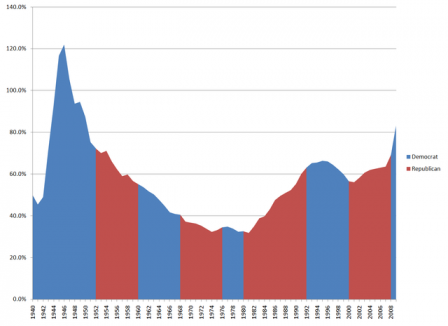This is the first of a four-part series where I’m going to make some pretty unconventional investment recommendations.
Today I’m going to tell you the “problem” and during the rest of the week I’m going to tell you how I think you can make money off the problem. I believe this is one of the scariest economic times in recent history, but if you prepare yourself financially there’s a good chance you can make a bunch of money while many people around you are losing their shirts.
Let’s get started.
The Next Bubble to Burst
Let’s pretend it’s December 2006 and you have $100,000 ready to invest in anything you want. Now let’s pretend that you were pretty sure the housing market was in a huge bubble and it was about to burst. What would you have done with all that money?
Let’s say you don’t want to be a complete conspiracy theorist so you put half your money, or $50,000, in the S&P 500 (price: $1,418.30) to be “safe”.
With the other half, you:
- Short Fannie Mae for $10,000 (price: $59.39)
- Short Bank of America for $10,000 (price: $53.39)
- Short big insurance company AIG because they are holding the PMI on a huge number of subprime loans (pre-reverse-split price: $1,433.20)
- Buy $20,000 worth of Gold ETF GLD (price: $63.21)
Here’s what those investments would look like today:
- S&P 500: $47,757.17 (-4.49%)
- Fannie Mae: $19,957.91 (+99.58%)
- Bank of America: $18,565.27 (+85.65%)
- AIG: $19,779.72 (+97.80%)
- GLD: $28,634.71 (+143.17%)
- Total: $154,694.79 (+54.69%)
As you can see, predicting the housing bubble bursting and investing half of your money on that happening would have resulted in about a 54% gain over a 3.5 year period. 54% is incredible any time, but it’s especially good over a 3.5 year period where almost everyone else lost money in the market.
I know what you’re thinking: it’s easy to suggest shorting financials and buying gold in 2006 when we’ve already seen history play out. But there are people, professional investors even, who were predicting the burst of the housing bubble in 2006. One professional investor, Peter Schiff, was ridiculed for these predictions on many TV shows. One host even said, “I know you want to continue that expose on Santa Claus.” You can see all the embarrassing proof in this youtube video:
Considering the fact that Peter Schiff successfully predicted the burst of the housing bubble in 2006, I was curious to find out what he believes is happening today. Luckily he just put out a new book titled The Real Crash.
Peter Schiff Says to Prepare for The Real Crash
Peter Schiff didn’t just predict the burst of the housing bubble; he is the CEO and chief global strategist of Euro Pacific Capital. Being a CEO of an investment brokerage doesn’t mean he can predict the future, but he’s not some Joe Schmo either.
In this book, Peter Schiff says the next bubble to burst isn’t an industry within the US economy; he says the next bubble is the American Government itself.
And I see no reason to doubt him. We all know Greece is in a boatload of trouble right now. Officially Greece’s debt-to-GDP ratio in 2011 was 165.3%. Due to Greece’s unsustainable debt problem interest rates on Greek two-year government bonds rose from 3.47% in January of 2010 to 177.37% in February of 2012.
Basically Greece has so much debt that no one is willing to lend them money. To put it in terms that are easy to understand, Greece is like a person who has $355,600 of debt, makes just $40,900 a year and spends $50,100 a year. Would you lend that person money? I doubt it. source-wiki
Obviously Greece is bad, so where is America today?
The American Government Bubble
In very rough numbers, we have about $16 trillion in debt, and our GDP is about $15 trillion. That makes our debt-to-GDP ratio of about 106%. America is like a person who owes $160,000 in debt, makes just $23,000 a year and spends $36,000 a year.
According to these numbers we aren’t as bad as Greece, but we also have some huge problems coming down the line.
Payments owed to Social Security and Medicare recipients aren’t included in the national debt. Assuming we keep Social Security and Medicare in their current forms (which is what both Democrats and Republicans want to do) that’s another $61.6 trillion that should be added to our debt. Take that into account and we look insolvent to me.
If our government was serious about fixing this problem, the first step would be to get tax revenue and spending on the same level. Unfortunately neither political party is proposing any significant spending cuts (which is the only solution in my opinion). If you are someone who believes taxes should be raised to fix the deficit, neither party is proposing any significant tax increases either (the Buffet Rule would bring in only $162 billion over 10 years, or about 1% of the debt).
It doesn’t matter whether we have a Democrat or Republican in the White House either. Since 2000 our government has shown no desire to decrease the national debt, and neither Barack Obama nor Mitt Romney has publicly stated any desire to stop spending more than we bring in from tax revenue.

How Much Time Do We Have?
If Peter Schiff and I are right and the American government “bubble” is going to pop, the question is “when?”
Unfortunately no one knows exactly when it will happen, but I can tell you what it will look like. When other countries start seeing American government bonds as risky investments they will start demanding higher interest rates like Greece is seeing now. You might remember hearing about the drop of the credit rating on US debt last year. That’s the first step to higher interest rates.
We paid $230 billion in interest on our debt in 2011. When (if) interest rates go up, that $230 billion a year could turn into $460 billion. Or $690 billion. Or worse.
At that point we won’t be able to borrow because interest rates will be too high, and we won’t be able to pay those increased rates because we won’t have the money. Either we default as a country, or we print a bunch of money and go through a period of hyperinflation.
No matter whether we default or hyperinflate the dollar, the result could be really bad for your investments if you don’t prepare yourself. I’ve personally been worried about the American Government bubble popping for some time, but I wasn’t smart enough to know what to do with my money to protect myself. Luckily Peter Schiff has some suggestions, which I’ll talk about over the next few days.
I’ll leave you with one final video that takes a humorous approach to explaining America’s financial situation:
If you are fascinated by finance and how it works, completing courses towards an economic crime management degree will not only help you have a better understanding of finance but also help you find the career the give you financial security.
Readers: Do you think the American Government is a bubble that is liable to burst in the next few years? If not, why?
Carnival Links
Yakezie Carnival at Edward Antrobus
Carnival of Retirement at Write and Get Paid
Carnival of MoneyPros at I Am 1 Percent
Y & T’s Weekend Ramblings at Young and Thrifty
Carnival of Fin. Camaraderie at The University of Money
Canadian PF Happy Hour at Canadian Personal Finance
Carnival of Financial Planning at The Skilled Investor
Kevin McKee is an entrepreneur, IT guru, and personal finance leader. In addition to his writing, Kevin is the head of IT at Buildingstars, Co-Founder of Padmission, and organizer of Laravel STL. He is also the creator of www.contributetoopensource.com. When he’s not working, Kevin enjoys podcasting about movies and spending time with his wife and four children.


I think it has potential but am hoping once things get serious enough or government steps up and deals with its problems. I also think if the economy comes back that all of this worry will have been for nothing. That said, there is no guarantee the economy will come back.
I wish I believed that. Unfortunately fixing these problems is going to take some amount of pain and current politicians are so worried about re-election that they put the pain off until later and just inflate the bubble bigger.
I don’t think it’s next — I think student loans are next, and then, not too far into the future, we’re in serious trouble.
I’ve written about the student loan bubble before, but I just don’t know what that bubble “popping” is going to look like. If it’s student loan forgiveness then I’m going to be really angry for a variety of reasons, but mainly because I worked hard to pay off my loans and don’t feel like other people should just have theirs forgiven.
Peter Schiff is a great example of a broken clock, but he was only right once.
That’s an interesting and potentially correct opinion, but without giving any fact-based reasoning why you think he’s wrong, your statement doesn’t mean very much.
After I read “Patriots: Surviving the Coming Collapse” by James Rawles this has been a reality of mine. It’s even scarier to watch things progress much like they do in the novel.
I think the government is on the right track to implode. I think we will begin to see an increase in violence in the next few years. Especially with numbers like 80,000 jobs a month and 85,000 disability claims.
I heard about that book but haven’t read it yet. I don’t know if the country is going to fall into complete anarchy when things get bad. I think it depends on how the government responds. If they hyperinflate to “fix” it then I can see the country collapse, but if they essentially declare bankruptcy and pay creditors what they can then I think we can start over without the violence and the collapse of modern society.
I think Peter Schiff knows his stuff. Have you seen him take on congress single handed? http://www.youtube.com/watch?v=FUhmoI4EZ98
He’s a modern day Ayn Rand hero.
“We tried your philosophy about a hundred years ago…” I don’t understand why personal responsibility is so much to ask.
I am totally fascinated by this post. Very much looking forward to your suggestions over the next week!
I know very little about investing, but it seems like many wealthy people got to their statuses in unconventional ways.
While I realize that the government needs some overhauling and it will be painful, I don’t foresee a complete collapse. I’m interested though to see what your investment suggestions are though. After all, if the US government goes away, so does the dollar, so anything we invest in (US stocks, bonds, etc) become worthless. When we can’t repay China and every other country the debt we owe them and demand drops because the US can’t buy anything, all of their currencies will deteriorate was well. All that is left are natural resources.
I think it’s short sighted to think that the world needs America to consume all the goods. Countries that are exporting more than they are importing are just saving up their money for when they can be the big consumers and cash in on all the producing they’ve been doing.
Anyone can consume. That’s easy. It’s producing that hard.
I’ve never trusted government . I think, we are in a big trouble.It is important to save money this days to prepare yourself for the future.
Holy shit! That video is AMAZING